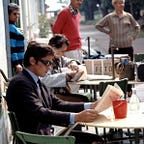Atlas Shrugged: Politics, Organized Crime, and Finance in Montenegro
In the aftermath of a scandal directly linking the country’s political leadership with corrupt activities, an unprecedented number of protesters swarmed the streets of Montenegro’s capital Podgorica. What can one expect now?
A first scandal?
Before President Donald Trump’s unceremonious shove of its Prime Minister at a 2017 NATO summit, Montenegro was largely known to Western audiences for its luxurious resorts and majestic mountainous highlands. Among the citizens of the five other countries that once made up the Socialist Federal Republic of Yugoslavia (SFRY), however, Montenegro is well known as a hub for illicit trade and corruption. If there is any truth to these preconceptions, it is certainly linked to the sulphurous reputation of the Montenegrin President Milo Đukanović.
Milo Đukanović first ran for Montenegro’s presidency in 1998. The erstwhile Titoist pioneer turned Serbian nationalist now branded himself as a Western reformer. He embraced free trade, liberal democracy, and championed Montenegro’s integration within the EU and NATO. Having been the country’s Prime Minister since 1989, Đukanović has effectively been in power for over three decades either as President or Prime Minister. His Democratic Party of Socialists (DPS) is the direct successor of the Montenegrin branch of the Yugoslav Communist League.
His rule has been marked by several controversies tying the leader and his entourage to criminal elements. Đukanović and his associates are known to have participated in significant cigarette smuggling endeavours with Neapolitan organized crime syndicates. At first, Đukanović denounced the allegations as a falsehood seeking to discredit Montenegro but then openly admitted it. Under the purview of diplomatic immunity, he was never charged. A similar defense was attempted by Svetozar Marović, a personal friend of Đukanović’s, in 2016, when the Budva prosecutor’s office accused him of leading an organized crime ring. Being only the Vice-President of the ruling party, Marović eventually pleaded guilty to the charges.
Marović’s case also proved that corruption is endemic in Montenegro. Ownership of the Montenegrin coastline was divided by the government among a slew of unsavory characters and shady businessmen hailing from places as diverse as the Gulf States, Azerbaijan, and Thailand. The state also gave ownership of Montenegro’s biggest bank to Aleksandar Đukanović, Milo’s brother. The bank was later seen to have acted as a money laundering medium for regional crime kingpins.
The Atlas affair
In January of 2019, Duško Knežević, a former supporter of Đukanović’s party and CEO of the Montenegro-based Atlas Group, leaked a video which depicted Knežević handing over an envelope allegedly containing a sum of 100,000€ to Podgorica’s mayor. Being that the mayor is an influential member of the DPS, Knežević explained that his “donation” would ensure that the Atlas Group would receive preferential treatment when it came to future construction bids and touristic ventures in Montenegro. Since then, Knežević fled to London and released documents indicating that President Đukanović had taken lavish vacations abroad whose tab was picked up by Atlas Group.
The eruption of this scandal came on the heels of other controversies implicating Đukanović’s government. During the parliamentary election of 2016, the DPS was accused of having carried out electoral fraud. Opposition parties also claimed that their activists were targeted and threatened by agents from the Ministry of Interior Affairs. The same Ministry was also implicated in the assassination attempt carried out in May of 2018 targeting the investigative journalist Olivera Lakić. As of today, 39 of the 80 members of Montenegro’s parliament are boycotting this institution. Still to this day, Lakić’s would-be assassins are unknown.
The Atlas Affair certainly motivated a great deal of the turnout seen during last February’s demonstrations. Whereas Montenegrins previously suspected political corruption, Knežević’s documented revelations revealed the existence of a system based on kickbacks that reached the country’s highest political echelons. They knew that the DPS bribed voters to earn their votes. They knew that to obtain a job in Montenegro one needs to have a relationship of some sort with a DPS higher-up. Knežević’s story only clearly established the existence of a corrupt, arbitrarily rigged system in the country.
The demonstrators have no predominant demographic. They are, in their respective way, both left-wing and right-wing. While the popular will seems present, is any true change viable? Are any expectations of change reasonable and viable so long as Milo Đukanović and those of his ilk remain in power?
